Last week I had the joy of returning to my undergraduate alma mater LeTourneau University for homecoming weekend. In addition to the homecoming festivities, I also gave a few talks while I was there. Today, I want to share with all of you what I shared with the students in chapel on Wednesday. In my remarks, I shared some lessons I've learned from the example of the University's founder and namesake, R.G. LeTourneau. I’ve included video and audio of the talk below along with the written reflection that inspired it.
As those of you who have been here for a while know, I'm a follower of Jesus. I see the work that I do—whether as an engineer, professor, writer, husband, dad, son, or friend—as fundamentally inseparable from the journey of following Jesus and seeking to honor him in the way that I live. In that respect, R.G. LeTourneau has served as a role model for me. I've learned a great deal from his journey of faith as he wrestled with what it meant for him to respond to God's call on his life.
Many of you reading this may not share my Christian convictions. Nevertheless, I hope that you might find the reflections and the ideas I shared with the LeTourneau community last week thought-provoking.
As always, I'd love to hear from you if anything here resonates with you or sparks your curiosity.
If there's one adjective to describe R.G. LeTourneau and his work, it's big. LeTourneau, colloquially known as R.G., is most famous for the massive earth-moving equipment that he built.

If you read his autobiography, you'll also get a sense that the adjective would adequately describe his personality too. With 299 patents to his name for a broad range of inventions in earthmoving equipment, manufacturing, and machining, it might surprise you to hear that R.G. never got past the seventh grade. Armed only with ideas from his time working in iron foundries and from mail correspondence courses, you'd be hard-pressed to find someone who predicted that R.G. would become the prolific inventor he did.

R.G. would be the first to admit the improbability of his story. What looks straightforward in hindsight was very often anything but in the moment. When speaking to audiences as he did regularly in the later years of his life, R.G. would frequently open by saying that he was just "a mechanic whom the Lord has blessed." This may sound like false humility, but as you read his story of repeated failure and many close calls with bankruptcy, it's not hard to find yourself agreeing with his assessment. With no logical explanation available for his success as an inventor and businessman, R.G. believed that his success was directly connected to his trust in and partnership with God.
[W]hat I’ve done, anyone can do with the help of God. Reporters have often asked me, “Did you start from scratch?” My answer to that is, “Every time.” I’ve been financially broke so often and in debt so long that it was a big day for us when my wife and I could move out of a cook shack and into a brand new tent. Spiritually, too, I was a bankrupt even before I lost my first dollar. Yes, I started from scratch, all right, and was still starting from scratch at the age of forty-four. And the One who picked me up and started me over with my strength and ambition fully restored is the same Lord and Savior available to all for the asking.
If you're anything like me, you may bristle at the phrase "God's partner." How arrogant can someone be? As a friend recently told me, "cheer up, it's worse than you think." Those feelings of discomfort and insufficiency are a good thing. When R.G. claims to be God's partner, it's clear he knows who is really carrying the load in the partnership. It's the same as any of our efforts to serve God: the best we can do is to respond in broken, half-hearted attempts that fall far short of the standard he calls us to.
R.G.'s story is one of his partnership with God. But more importantly, it's an invitation for us to begin our own.
Partnership with God is a Redemptive Quest
Growing up in a family full of missionaries, R.G. understood at least one model of working in partnership with God. But what he didn't understand was that going into traditional full-time ministry as a pastor or missionary was only one of many ways to partner with God.
In the middle of a sleepless night, R.G. wrestled with this dilemma. Did giving his life to God mean walking away from the work he loved building machines? Did surrender to God mean going into full-time ministry as a pastor or missionary? In the middle of the night, staring out over the ranch yard at the machines he loved to imagine and create, he struggled to make sense of God's call.
The next morning, bleary-eyed and tired, he went to the home of his pastor, the Reverend Devol. Oh that we might all have wise and faithful friends like R.G.'s pastor. R.G. shared his dilemma, struggling to find the consonance between his talents as an engineer and the narrative that he had been taught to believe—that serving God faithfully meant entering ministry full-time.
In the moments that followed, God spoke to him through the words of his pastor. Words that would change not only his life but the lives of people like me who would hear a similar call at pivotal moments in our lives. "You know Brother LeTourneau," Devol said, "God needs businessmen as well as preachers and missionaries."
God needs businessmen
This phrase became the foundation of R.G.'s life. It offers a foundation for us as well. As creatures made in his image, God has gifted each of us with unique gifts, talents, and resources and calls us to steward them in ways that bring him glory. But just like R.G. before he met with his pastor, we might also think that the best—or only—way to honor God is to forsake whatever profession we are currently pursuing—be it as a plumber, electrician, pipe fitter, doctor, engineer, barista, waiter, or otherwise—to become a missionary or pastor.
I'm convinced that there is no single idea that more severely limits our imagination about what it means to follow Jesus faithfully than this misconception. God does call some of us to follow him in the way that he called Peter, James, and John, telling them to lay down their nets and follow him. The call to enter full-time ministry is legitimate. And yet, for most of us, God calls us to serve him in the same way that he called R.G. Not by changing what we are doing, but by helping us reimagine how and why we are doing it.
Partnership with God is a Redemptive Quest
R.G.'s story offers us an example of what it looks like to faithfully follow Jesus. But as recounted in his autobiography, it serves as a descriptive rather than prescriptive account of what it means to be in partnership with God. In revisiting R.G.'s story recently, I've been asking myself what it means for me. What does it mean for me to be in partnership with God?
As I have been pondering that question, I've been inspired by another idea that has loomed large in my imagination of late: the redemptive quest. The concept of the redemptive quest is articulated in an essay from Praxis co-founder and CEO Dave Blanchard. In the essay that he delivered to the Praxis community at their annual summit in 2023, Dave challenges us to find redemptive quests: journeys through life that call us to pursue the redemptive way as we seek to be part of God's work in restoring creation.
Redemptive quests are built on an idea that has deeply formed me since my time at LeTourneau: the one-pot system. In perhaps the most formational five minutes of my life, my friend and mentor Bill Graff deconstructed one of the most pervasive and damaging myths about life as a Christian: the idea that there is a fundamental distinction between sacred and secular work.
Although he didn't know it through the framework of Dr. Graff's two-pot system analogy, this was something that R.G. deeply understood. In fact, it was the very same five-minute message that dramatically changed his life too, that morning with his pastor.
What is a quest and what makes it a redemptive one?
As we think about the quest that God might be calling us to embark upon, it's worth spending a few moments to define what exactly a quest is and then consider what makes it redemptive.
The quest is an archetypal plot line: once you're aware of it, you'll see it everywhere. It's Frodo taking the One Ring to Mordor, Luke Skywalker destroying the Death Star to save the galaxy, or Paul Atreides as he wrestles with the implications of the prophecies of the Kwisatz Haderach. The template of a quest is also stamped throughout the pages of the biblical narrative. From Abraham, Jacob, Joseph, Moses, Joshua, Esther, and David, all the way through to Jesus, the story of God's work is full of adventure.
At their core, quests are motivated by a clear purpose. However, despite a clear goal, the path to get there is unknown. Quests don't have turn-by-turn directions. They are fundamentally evolutionary, moving one step at a time with limited insight into the future.
But a quest alone is not enough. As Christians, we are called by God on redemptive quests. Redemptive quests are those that follow the pattern of creative restoration through sacrifice. They are quests that embrace the opportunities we have to bless others and renew the culture around us. They are centered not on ourselves, but on our neighbor.
The redemptive way gives us a framework through which we can evaluate the quests before us. As we choose our quest, we can discern its redemptive character. Dave offers a few defining marks which I've reframed here as questions:
Is it truly consequential? If so, it's worth doing even if we fail.
Does it have a catalytic effect? If so, it helps us to change not just individuals, but systems.
Is it focused on people or institutions at risk? If so, it protects the vulnerable.
Does it reshape our cultural imagination? If so, it helps to create opportunities that were previously thought impossible.
Does it require repeated re-risking? If so, it models Jesus's call to die to ourselves.
Is it nonobvious from a market perspective? If so, it demands our imagination.
Does it require long-term vision? If so, it embraces patient hope for sustained change rather than buying into short-term hype cycles.
Is it compelled by love and dispassionate about credit? If so, it is a quest worth journeying toward together.
These questions will help us to evaluate the potential quests before us and weigh whether the vision for the influence we want to have on our world is truly stewarding the time, talents, and treasure that God has entrusted to us.
As with any human, we must be mindful to avoid idolizing them as an exemplar. As followers of Jesus, we have one, and exactly one, exemplar. But despite his flaws—which he does not hesitate to document in his autobiographical account—R.G. remains one of my heroes.
As I think about my desire to pursue my own redemptive quest, I'm continually reminded not only by R.G.'s example but by his words. Throughout his life, he recognized that to be in partnership with God is a privilege we do not deserve. The privilege to partner with God on the redemptive quests on which he calls us is motivated by the same love that calls us back into relationship with him—a love that sent Jesus to earth to live a sinless life, to die, and to be raised again to life to create a way for us to be restored in relationship with God.
With this in mind, we should not be shy to follow R.G.'s example: to begin on our knees surrendering our lives to Jesus, and only then to get to our feet to run hard after the quest set before us.
R.G. was a man with a big shovel. He is responsible, perhaps, for moving more dirt than any other single human in history. But what truly gave R.G.'s efforts lasting power was that he never lost track of what it means to be in partnership with God: despite our best efforts to shovel out more for God, he's got a bigger shovel. Not only that, but he owns all the dirt too.
I would not lightly refer to God as my partner. He is my Lord and Savior, and I am His servant. But by His grace He has made us members of His family, and we can refer to Him as our Father which art in Heaven. More than that, He has let us be “workers, together with Him.” The Bible says, “We then, as workers, together with Him, beseech you also that ye receive not the grace of God in vain.” II Corinthians, 6:1. So it is in that sense that I mean we are partners, remembering always that real partners don’t try to see how much one can get from the other. They work for the good of the partnership. They try to help each other. I remember one of my customers who told me, “I try to shovel out more for God than He can for me, but He always wins. He’s got a bigger shovel.”
Reading Recommendations
Lots of great things to read this week. Here are a few:
writes a great review of and ’s new book AI Snake Oil over at his Substack . As usual with Rob, we also get a taste of some William James in the mix too.It may seem as though we are simply talking about technology, but when it comes to AI, we are talking about whether we can or should use the technology to attempt to know the unknowable, what William James described as “our indomitable desire to cast the world into a more rational shape in our minds than the shape into which it is thrown there by the crude order of our experience.” Using AI models to try to predict academic failure, criminal behavior, disease, and job performance is one expression of this desire. So, too, is using AI to moderate the ugly and harmful discourse on social media platforms. The belief that there is some form of computational intelligence that will exceed the general capabilities of human beings to solve these and other social problems is the ultimate expression of faith in rationality.
I already mentioned Dave Blanchard’s 2023 essay on redemptive quests earlier in this post, but here’s another link to it. You’ll also likely enjoying watching the recorded talk he gave based on it.
Together, we need to cultivate a community where “crazy is a compliment”; where spiritual practices such as daily prayer and Sabbath are a catalyst for imagination; where all work and money is missional; and where one’s identity is not bound in conventional definitions of success. A place where, as Praxis Venture Partner Dave Evans says, “grace means go.”
It’s amazing what we have at the tips of our fingers on YouTube these days. I’ve been enjoying watching clips of R.G.’s machines in action this last week.
The Book Nook
I’m going to once again recommend R.G. LeTourneau’s Mover of Men and Mountains this week. After this week’s essay, I hope you have a more complete understanding of why R.G. inspires me.
The Professor Is In
The professor was out last week. I was grateful to get to visit with many friends, old and new back in East Texas. This week I’m trying to come up for air from under mountains of email.
Leisure Line
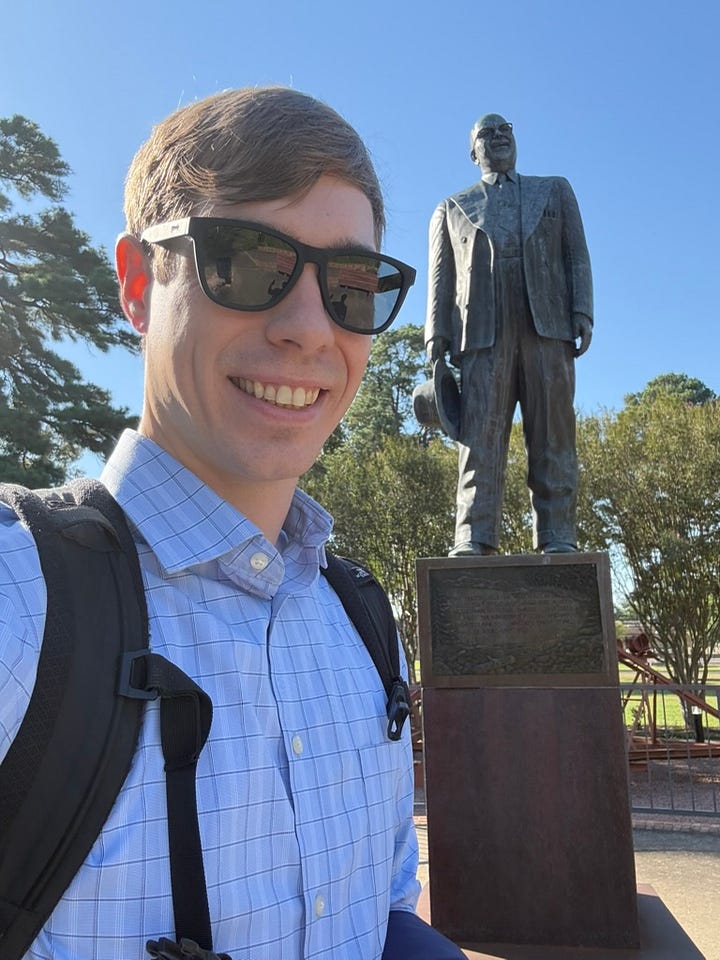
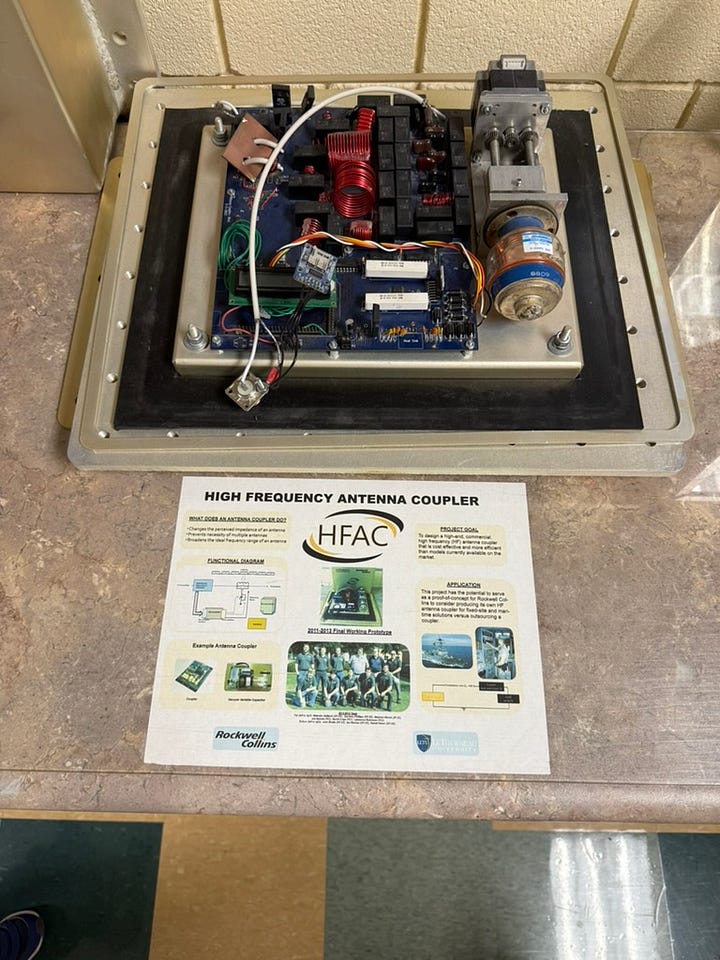

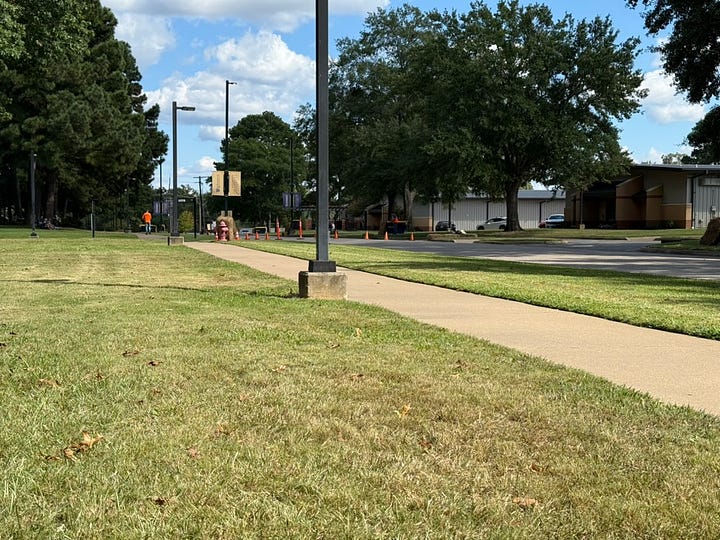
A few photos from around campus. A picture with R.G.’s statue, my senior design project which still lives in a hallway of the engineering building (a good argument for putting your capstone project in a nice box!), my grandfather’s plane which now hangs from the ceiling in the atrium of LeTourneau’s Abbot Aviation Center, and a photo of the go-kart track that was set up on campus on Saturday.
Still Life
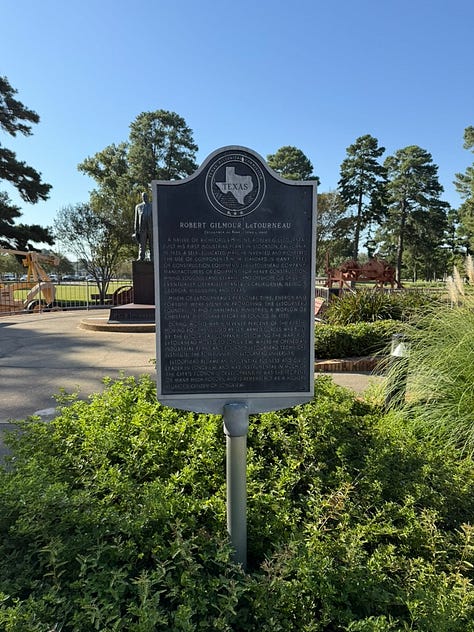
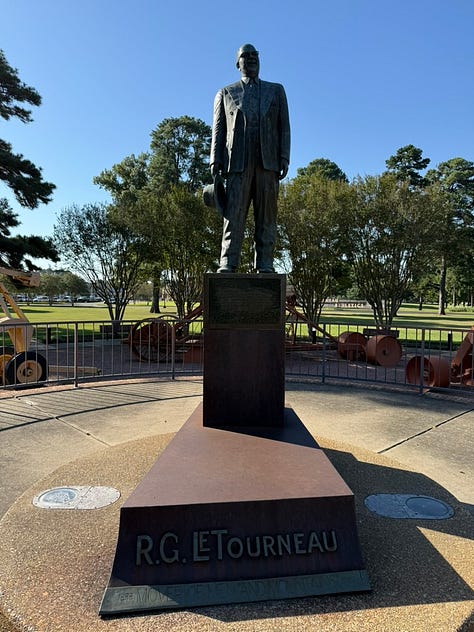

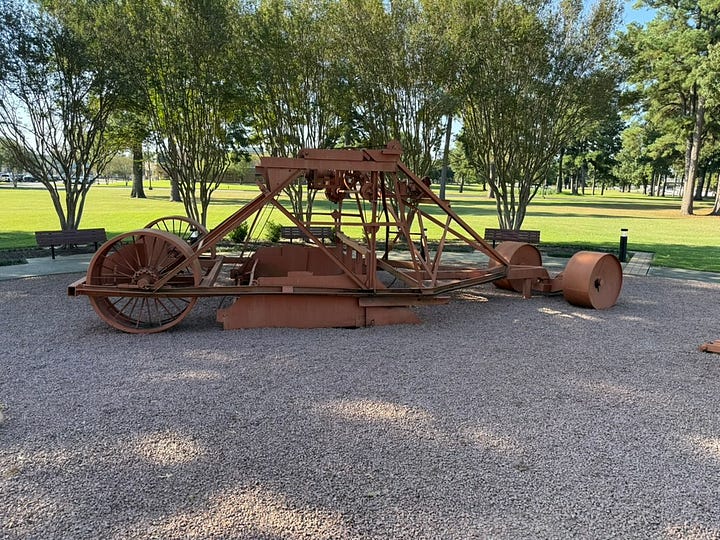
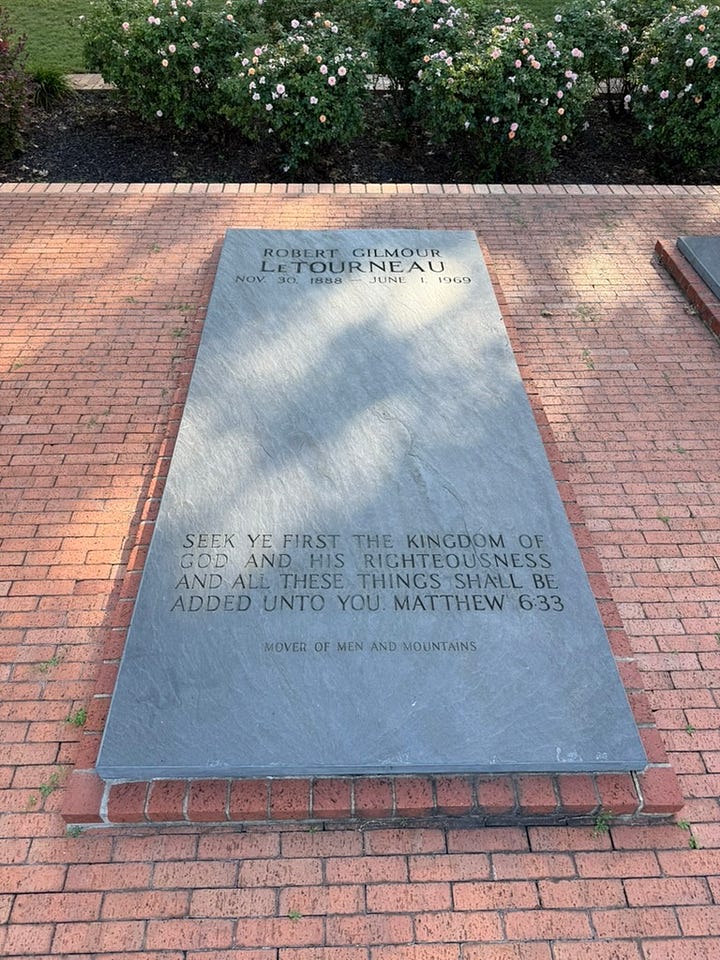
Some more photos of R.G. and his machines.
And lastly, a beautiful photo looking down the mall toward the bell tower.






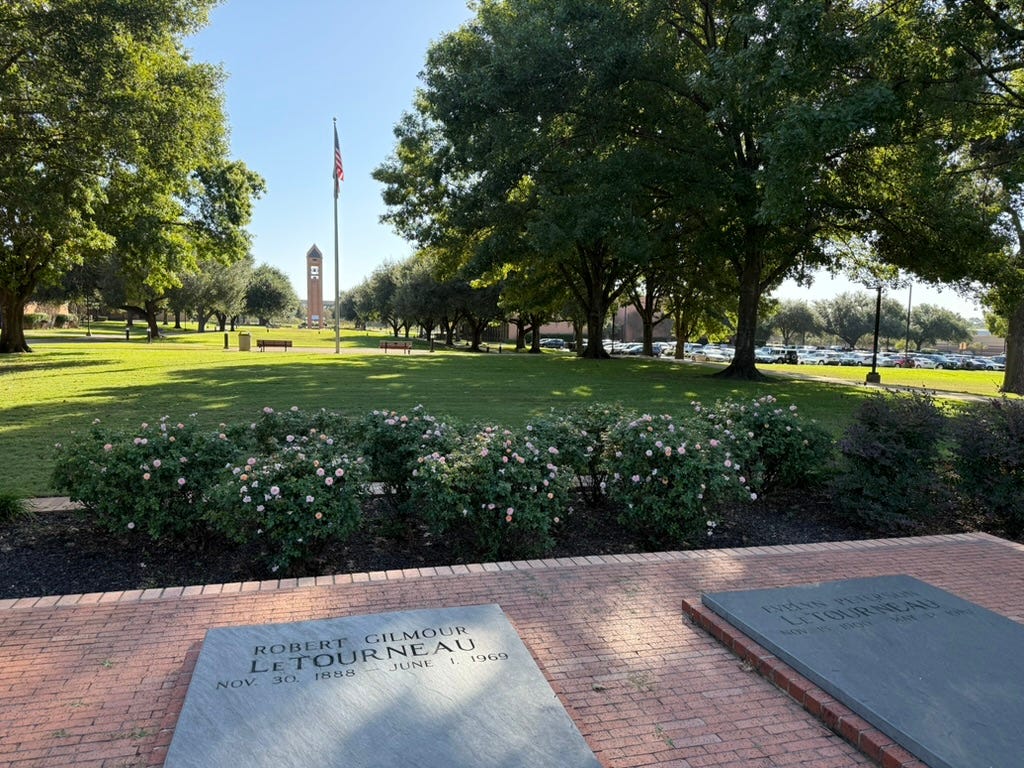
You have created a wonderful checklist for redemptive quests, to inspire all of us to continue quests in the face of self doubt. Thank you.
As a practicing Hindu, your words speak to me. In the Bagavad Gita, chapter 2, verse 47 there is a beautiful line which resonated with the ideas you outlined above:
BG 2.47: You have a right to perform your prescribed duties, but you are not entitled to the fruits of your actions. Never consider yourself to be the cause of the results of your activities, nor be attached to inaction.
Keep writing and keep inspiring your students Dr. Brake. God bless you 🙏
Great to read. I am a LeTourneau grad also (BA’89). Thanks for a very reflective post. I have fond memories of my time there. Blessings on you and your family.